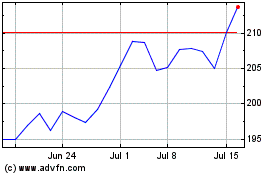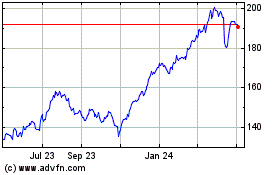By David Benoit
Jamie Dimon is facing a Warren Buffett-like problem: a lot of
cash and an expensive stock.
Over the past three years, Mr. Dimon's JPMorgan Chase & Co.
has spent most of its profit on share repurchases. That has been a
boon for shareholders, since buybacks typically increase a
company's stock price.
The issue now is that JPMorgan shares, trading as they are at
record highs, are getting more expensive. Analysts and investors
are starting to ask if that means repurchases will slow.
Chief Financial Officer Jennifer Piepszak said on a conference
call last month that the bank would "look at alternatives" to
buybacks if the stock continued to rise. "It's a high-class
problem," she said.
That high-class problem is concerning for some. Banks' margins
and profits are expected to slip this year as interest rates stay
low. Slower buybacks could add to the pressure on returns and,
therefore, the stock.
"That puts them in a bind," said D.A. Davidson & Co. analyst
David Konrad. "There are a couple headwinds, and one of them is the
expectation the buyback starts to decline."
In a buyback, a company uses its cash to buy its own existing
shares, reducing its share count. That means a company's per-share
earnings can rise even if profits don't. Buybacks can be a
self-fulfilling prophecy for the stock price: Since each remaining
share gets a bigger piece of the profit and value, that can drive
investors to bid up the shares.
Buybacks return profits to shareholders, but they reward
investors in the long term only if shares keep rising. There's a
long tradition of executives proving overly confident about future
prospects and spending billions to buy stocks that then go south.
Big banks, including JPMorgan, Citigroup Inc. and Bank of America
Corp., had big buybacks in the years just before the financial
crisis. Citigroup and Bank of America haven't yet recovered those
prices.
JPMorgan has, and it has also been posting record profits. Its
recent buyback spree has been a good deal. The $59.5 billion of
shares JPMorgan repurchased in the past three years would now be
worth about $75 billion.
As buybacks have surged across corporate America, they've
spurred criticism that companies are failing to think long term and
care only about stock prices. Democratic presidential candidates
including Elizabeth Warren and Bernie Sanders have discussed
whether to restrict how much stock U.S. companies can buy back,
arguing that the money would be better spent on employee wages
instead.
Mr. Dimon says he prioritizes investments in the bank first,
then dividends and then buybacks. He says he would repurchase stock
only when it was a good value for the company compared with other
potential returns.
The bank has increased spending in recent years above
competitors, with big bets on technology, new branches and
expansions overseas, but is nearing a ceiling and is expected to
keep spending near current levels.
JPMorgan has also increased its dividend 10 times in the past
nine years. But banks have to hold extra capital if they decide to
pay dividends, and shareholders have to pay taxes on them.
What's left is buybacks. Investors and analysts regularly seek
updates on where Mr. Dimon's ceiling is for them. It has been
creeping upward along with the bank's stock and profitability.
He said in 2012 the math started making less sense when the
stock traded above 1.35 times tangible book value, a measure of the
worth of a company's assets. In 2017, he said it still made sense
to repurchase around 2 times tangible book. In 2018 he said he
wouldn't do it at 3 times tangible book, though, calling it
"crazy."
JPMorgan's tangible book value is now at $60.98 a share and the
stock has been trading near $140 this year, about 2.3 times the
metric. (The stock has slipped recently.) A year like the stock had
in 2019, when it gained more than 40%, would likely put it past 3
times.
JPMorgan has paid out $87 billion in buybacks and dividends over
the past three years -- 98% of its profits, roughly in line with
rivals. Most of that has been through stock repurchases.
The buybacks have juiced per-share earnings. The bank earned
$10.72 a share in 2019. If the share count had stayed flat from the
end of 2016, all else being equal, that would have been $9.49.
Investors say they still support repurchases for the same
reasons executives have defended them: JPMorgan's profitability is
high and buybacks seem better than other options. By several
metrics, JPMorgan and banks broadly remain cheap compared with
other stocks.
"They aren't compromising on any investments," said Kush Goel, a
senior research analyst at investor Neuberger Berman. "I'm not sure
it feels too rich to buy back stock at this level."
Mr. Buffett, who has been buying JPMorgan shares, appears to
agree. There's no more famous example of a company struggling with
how to spend billions of dollars than Mr. Buffett's Berkshire
Hathaway Inc., which has failed to find big deals in recent years,
lagged its historical returns and come under once-inconceivable
pressure for not buying back more of its stock.
Mr. Buffett has said the same value Mr. Dimon described as
"crazy" to repurchase shares would be a bargain. The bank is worth
"way more," he told CNBC last year.
Write to David Benoit at david.benoit@wsj.com
(END) Dow Jones Newswires
February 02, 2020 05:44 ET (10:44 GMT)
Copyright (c) 2020 Dow Jones & Company, Inc.
JP Morgan Chase (NYSE:JPM)
Historical Stock Chart
From Mar 2024 to Apr 2024

JP Morgan Chase (NYSE:JPM)
Historical Stock Chart
From Apr 2023 to Apr 2024
